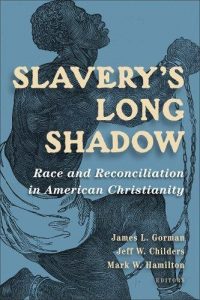 Slavery’s Long Shadow: Race and Reconciliation in American Christianity was recently edited by GST alumni and faculty, Dr. Jamey Gorman (M.Div. ’08), Dr. Mark Hamilton (M.Div. ’90) and Dr. Jeff Childers (’89). The editors have brought together 14 contributors (see full list below) to honor the work of church history scholar Dr. Douglas Foster. Although Foster retired from Abilene Christian University last year, he continues to leave a legacy around the world through his publications, influence on countless students, and devotion to the church.
Slavery’s Long Shadow: Race and Reconciliation in American Christianity was recently edited by GST alumni and faculty, Dr. Jamey Gorman (M.Div. ’08), Dr. Mark Hamilton (M.Div. ’90) and Dr. Jeff Childers (’89). The editors have brought together 14 contributors (see full list below) to honor the work of church history scholar Dr. Douglas Foster. Although Foster retired from Abilene Christian University last year, he continues to leave a legacy around the world through his publications, influence on countless students, and devotion to the church.
We asked the editors to say a few words about Foster:
Hamilton: “Doug is an exemplary colleague: committed to the finest qualities of the art of the teacher, passionate about things that matter, persistent in bringing people together in situations of understanding and mutual support. He treats his colleagues with grace and respect. I never fail to learn something from him every time we meet. And so this book is a small token of our esteem for the man and the pursuits in which he engages.”

Dr. Douglas Foster
Childers: “The book’s contributors are exceptional scholars who want to honor Doug Foster, recognizing his extraordinary impact on our understanding of the issues surrounding religious and racial disunity in American Christianity. Foster has been an outstanding model for the pursuit of unity, personally and professionally. Recognizing his many years as a gifted teacher, we designed Slavery’s Long Shadow to be especially useful as a textbook.”
Gorman: “When Jeff and Mark approached me about joining them as a co-editor of a book that would honor the life and work of Doug Foster, I was ecstatic. Doug has been an academic mentor of mine for more than a decade, and he was the most formative influence in my decision to pursue doctoral studies in the history of Christianity and the Stone-Campbell Movement. As Jeff, Mark and I brainstormed what the book might include, it quickly became clear that we could construct a tightly focused book that engaged Doug’s concerns for Christian unity, racial justice and the history of American Christianity.”
Excerpts from the first chapter of Slavery’s Long Shadow:
“The central argument of this book is that at the center of the story of American Christianity is the inextricable connection of race relations and Christian unity. This connection provides a coherent theme and question that runs throughout the essays: How have race relations and Christian unity interacted and shaped both the church and the larger American culture? Encounters of white and black people in the Christian community have produced some of the most heinous ideas and actions in history, but they have also incited beautiful acts of love, kindness and sacrifice for the marginalized. Interactions of black and white Christians have sometimes prompted interracial cooperation in pursuit of justice for all people, but they have also led to the greatest racial divide in American society today – segregated worship services on Sunday morning. The way race relations have proceeded within Christianity often shaped American culture, and vice versa.
“This book is designed especially for undergraduate students wishing to understand how historical realities of race relations and Christianity have formed American history up to the twenty-first century. The book is meant to supplement survey college courses in American history and religion. The book’s three sections offer users three entry points into the conversation – five chapters covering major historical periods, four case studies and three chapters exploring ways forward. While some essays may break new ground, the purpose of the essays is to synthesize and present scholarly consensus and debate for the student, teacher, and lay reader.”
Slavery’s Long Shadow is now available for preorder and will be published and shipped in February 2019. Preorder your copy today through Wm. B. Eerdmans Publishing Co.
Contributors:
- Dr. Tanya Smith Brice
- Joel A. Brown (’09)
- Dr. Lawrence A.Q. Burnley
- Dr. Jeff W. Childers (’89)
- Dr. Wes Crawford (M.Div. ’02)
- Dr. James L. Gorman (M.Div. ’08)
- Dr. Richard T. Hughes (M.A. ’67)
- Dr. Loretta Hunnicutt
- Dr. Christopher R. Hutson
- Dr. Kathy Pulley (M.A. ’80)
- Dr. Edward J. Robinson
- Kamilah Hall Sharp
- Dr. Jerry Taylor
- Dr. D. Newell Williams
